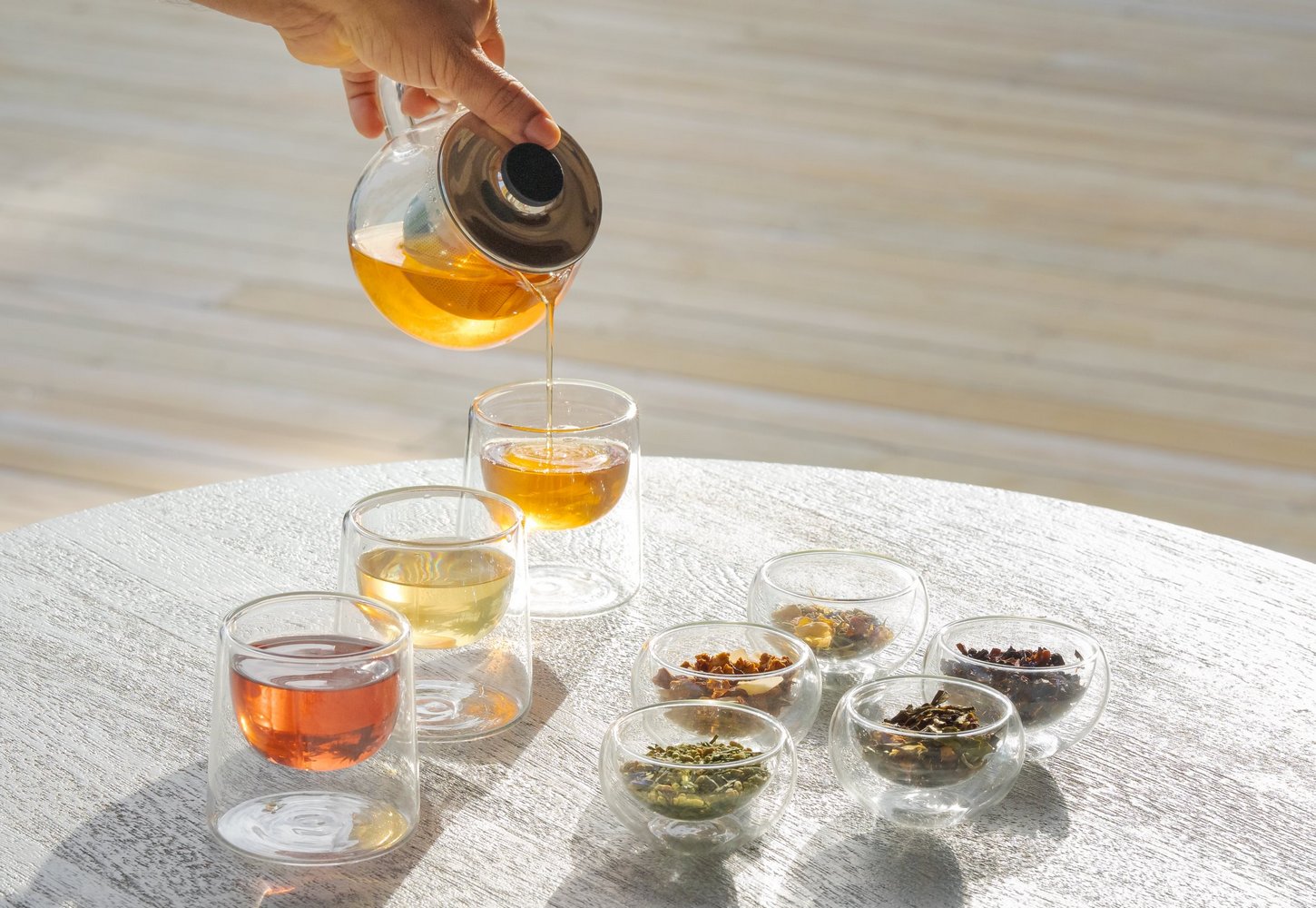Tales of Tea
Each tea-growing region has its own history, traditions and customs. Join us for an exploration of tea cultures around the world.
China
With a rich history going back millennia, Chinese tea culture has a diverse range of teas, including white, green, yellow, red (commonly known as black), oolong and pu-erh. Tea is viewed as a union of nature and human, as seen by the Chinese character for the word — a combination of “grass”, “human” and “tree”.
Tea is deeply ingrained in Chinese society and is often served as a gesture of hospitality and respect. Traditional ceremonies, like Gongfu Cha (which literally means tea-brewing skills mastered by discipline and practise), emphasise the art of brewing and the appreciation of flavours and aromas.
Interestingly, some historians suggest that Tibetans were the first to invent bulletproof beverages. Indeed, Tibetans have developed a distinct way of preparing pu-erh tea. They began adding yak butter to tea for a higher caloric energy intake, suitable for the strain of daily activities in high altitudes, and salt to bring out the flavour.
The various benefits of Chinese teas are connected to all Four Pillars of JOALI BEING. Notable examples include Da Hong Pao, an oolong tea from the Wu Yi mountains also known as a Rock Tea; Jin Jun Mei, a beautiful, mellow yet aromatic red tea; and Lung Jing, a pan-roasted green tea, one of the ten most famous teas of China.
Japan
Renowned for its emphasis on simplicity and mindfulness, Japanese tea culture is best known for its ceremonial preparation of Matcha, a powdered green tea. The famed Chanoyu tea ceremony is a highly choreographed ritual that embodies harmony, respect and tranquillity. It originated as a mindfulness ritual amongst Buddhist monks, gaining popularity with the spread of Zen Buddhism.
Matcha is often enjoyed in traditional tea houses and is believed to promote mental clarity, focus and serenity. It is also one of the most concentrated sources of L-theanine, a powerful amino acid that lowers blood pressure, boosts immunity and improves sleep quality.
Other well-known Japanese teas include Sencha (steamed green tea), Genmaicha (with roasted rice), and Gyokuro (shaded green tea, the most “luxurious” green tea in Japan).
Taiwan
Taiwan is celebrated for its high-quality oolongs, including Tie Guan Yin, Dong Ding and Oriental Beauty. Tea connoisseurs love the intricate flavours and aromas of these oolongs, often steeped multiple times to extract their full potential.
Taiwanese teas are cherished for their diverse flavours, ranging from floral and fruity to toasty and creamy, with associated health benefits like improving digestion and supporting the gut microbiome. A Gongfu-style tea preparation is popular in Taiwan, showcasing the skilful art of tea brewing and elevating the tea-drinking experience.
India
Celebrated for its vast tea production, India boasts regions like Darjeeling, home to the “champagne of black teas”; Assam, which produces amazing soft black teas best enjoyed with milk and spices; and Nilgiri, where several tea gardens practice biodynamic production.
Masala Chai, a spiced milk tea, holds a significant place in Indian culture and is enjoyed across the country. Each region, and often each family, has its own beloved recipe for Masala Chai. The spices used in this tea are known for their Ayurvedic health benefits.
Different types of Indian teas, including black, green and herbal infusions, offer a range of flavours, aromas and beneficial effects, such as boosting immunity and promoting overall wellbeing.
Russia
In Russian culture, tea is an integral part of social gatherings and is often served in a Samovar, a traditional tea urn. Black teas, such as Russian Caravan, are often accompanied by sweet treats like pastries and jam.
Tea-drinking in Russia fosters a sense of warmth, hospitality and connection, reflecting the nation’s long-standing and unique tea traditions. Russia was engaged in tea trade with China long before other European countries, which created widespread awareness of Oriental tea-drinking practices such as mindful contemplation and appreciation.
Russia’s developing herbalism led to the popularity of easy-to-grow tea substitutes amongst those who couldn’t access Chinese teas. Herbal alternatives like Ivan Chai and Rosebay Willowherb, which have a very similar flavour profile to black tea, are enjoyed in Russia even today. Local tea cultivation finally started in Georgia, using Chinese tea seeds. The region supplied tea to all the USSR countries throughout the Soviet period.
Turkey
Turkish tea, known as çay, holds a special place in Turkish culture and is served in traditional tulip-shaped glasses. Black tea, predominantly sourced from the Rize and Trabzon regions, is brewed using the double-teapot method. It is such a staple in local households that Turkey has one of the highest per-capita consumption rates of tea: on average, each Turk drinks 1,300 cups of tea a year.
Tea is enjoyed throughout the day, often in social settings, facilitating conversation and creating a sense of community. Valued for its bold flavour, Turkish tea also provides a natural energy boost and aids digestion.
